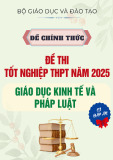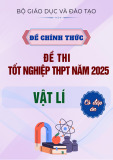
B GIÁO D C VÀ ĐÀO T O Ộ Ụ Ạ K THI TRUNG H C PH THÔNG QU C GIA NĂM 201Ỳ Ọ Ổ Ố 8
Bài thi: NGO I NG ;Ạ Ữ Môn thi: TI NG ANH Ế
Đ THI THAM KH OỀ Ả Th i gian làm bài: 60 phút, không k th i gian phát đ ờ ể ờ ề
(Đ thi có 0ề7 trang)
H , tên thí sinh: ……………………………………………….ọ
S báo danh:………………………………………………….ố
Mark the letter A, B, C, or D on your answer sheet to indicate the word whose
underlined part differs from the other three in pronunciation in each of the following
questions.
Question 1: A. species B. invent C. medicine D. tennis
Question 2: A. superstar B. harvest C. particular D. part
Mark the letter A, B, C, or D on your answer sheet to indicate the word that differs
from the other three in the position of primary stress in each of the following
questions.
Question 3: A. commercial B. constructive C. essential D. national
Question 4: A. curriculum B. economics C. hesitation D. calculation
Mark the letter A, B, C, or D on your answer sheet to indicate the underlined part that
needs correction in each of the following questions.
Question 5: Rainforests are being cut and burning at such a speed that they will
disappear from the earth in the near future.
A. are being cut B. burning C. such a speed D. from
Question 6: If there’re a funnier person in the world than him, I don’t know who it will be.
A. there’re B. funnier C. than D. will
Question 7: More than people there are, especially in poor countries with limited
amounts of land and water, the fewer resources there are to meet basic needs.
A. More than B. limited C. amounts of D. to meet
Mark the letter A, B, C, or D on your answer sheet to indicate the correct answer to
each of the following questions.
Question 8: Regular exercise and good diet will bring ________ fitness and health.
A. from B. to C. about D. up
Question 9: The pool should not be made so deep________ small children can be safe
there.
A. if B. so as to C. though D. so that
Question 10: We all agree that she is ___________student in our class.
A. the cleverest B. A more clever C. most clever D. cleverest

Question 11: There has been a great increase in retail sales, __________?
A. hasn’t there B. isn’t there C. isn’t it D. doesn’t it
Question 12: As a millionaire who liked to show off her wealth, Mrs. Smith paid _______
we asked.
A. four time much than B. four times as much as
C. four times much as D. four time as many as
Question 13: We _______ touch since we _______ school three years ago.
A. lost / have left B. have lost / leave C. have lost / left D. were losing / had left
Question 14: There was a___________ table in the middle of the room.
A. Japanese round beautiful wooden B. beautiful wooden round Japanese
C. beautiful wooden Japanese round D. beautiful round Japanese wooden
Question 15: She asked ________so embarrassed when he saw Carole.
A. why did Mai look B. did Mai look C. why Mai looked D. why looked
Question 16: A/An_______is an official document stating that you have passed an
examination, completed a course, or achieved some necessary qualifications
A. certificate B. requirement C. education D. test
Question 17: _________flowers are usually made of plastic or silk.
A. Unreal B. False C. Artificial D. Untrue
Question 18: When the manager of our company retires, the deputy manager will______ that
position.
A. take over B. catch on C. stand for D. hold on
Question 19: The police have begun an__________ into the accident which happened this
afternoon.
A. investigating B. investigatory C. investigate D. investigation
Mark the letter A, B, C, or D on your answer sheet to indicate the most suitable
response to complete each of the following exchanges.
Question 20: Tom: “_______________”
Mike: “I won’t say no!”
A. How are things with you, Mike?
B. What about playing badminton this afternoon?
C. Mike, do you know where the scissors are?
D. What’s your favourite, tea or coffee?
Question 21: Stephanie: “Oh, no! I left my book at home. Can I share yours?”
Scott: “_______”
A. No, thanks. B. No, not at all!
C. Yes, I do too D. Yes, sure!
Mark the letter A, B, C, or D on your answer sheet to indicate the word(s) CLOSEST
in meaning to the underlined word(s) in each of the following questions.
Question 22: You must answer the police’s questions truthfully; otherwise, you will get
into trouble.

A. exactly as things really happen B. with a negative attitude
C. in a harmful way D. as trustingly as you can
Question 23: Lack of water and nutrients has impeded the growth of these cherry tomato plants
A. promoted B. assisted C. realized D. prevented
Mark the letter A, B, C, or D on your answer sheet to indicate the word(s)
OPPOSITE in meaning to the underlined word(s) in each of the following questions.
Question 24: For most male spiders courtship is a perilous procedure, for they may be
eaten by females.
A. complicated B. dangerous C. safe D. peculiar
Question 25: A chronic lack of sleep may make us irritable and reduces our motivation to
work.
A. uncomfortable B. responsive C. miserable D. calm
Mark the letter A, B, C, or D on your answer sheet to indicate the sentence that is
closest in meaning to each of the following questions.
Question 26: You are in this mess right now because you didn’t listen to me in the first
place.
A. If you listened to my advice in the first place, you wouldn’t be in this mess right now.
B. If you listen to my advice in the first place, you will not be in this mess right now.
C. If you had listened to my advice in the first place, you wouldn’t be in this mess right now.
D. If you had listened to my advice in the first place, you wouldn’t have been in this mess right
now.
Question 27: She was so busy that she couldn’t answer the phone.
A. She was very busy that she couldn’t answer the phone.
B. She was too busy to answer the phone.
C. She was too busy not to answer the phone.
D. She was very busy so that she couldn’t answer the phone
Question 28: It’s no use reading that book.
A. You should read that book. B. That book has not been used.
C. That book is not worth reading. D. I have used the book for a long time.
Mark the letter A, B, C, or D on your answer sheet to indicate the sentence that best
combines each pair of sentences in the following questions.
Question 29: He had just finished eating his breakfast. Then he fell down
A. Hardly did he finished eating his breakfast when he fell down
B. Hardly he had finished eating his breakfast when he fell down
C. Hardly have he finished eating his breakfast when he fell down
D. Hardly had he finished eating his breakfast when he fell down
Question 30: She was the first woman in the Philippines. She was elected as the president
of the country.
A. She was the first woman being elected as the president of the Philippines.
B. She was the first woman who is elected as the president of the Philippines.

C. She was the first woman to be elected as the president of the Philippines.
D. She was the first woman elected as the president of the Philippines.
Read the following passage and mark the letter A, B, C, or D on your answer sheet to
indicate the correct word or phrase that best fits each of the numbered blanks from 31
to 35.
In a world where 2 billion people live in homes that don't have light bulbs, technology holds
the key (31)______ banishing poverty. Even the simplest technologies can transform lives
and save money. Vaccines, crops, computers and sources of solar energy can all reduce
poverty in developing countries. For example, cheap oral-rehydration therapy developed in
Bangladesh has dramatically cut the death (32)______ from childhood diarrhoea.
But even when such technologies exist, the depressing fact is that we can’t make them
(33)______ for those who most need them. Solar panels, batteries and light bulbs are still
beyond the purse of many, but where they have been installed they change lives. A decent
light in the evening gives children more time for homework and extends the productive day
for adults.
Kenya has a thriving solar industry and six years ago Kenyan pioneers also (34)______
connecting schools to the Internet via radio links. These people were fortunate (35)______
being able to afford solar panels, radios and old computers. How much bigger would the
impact be if these things were made and priced specifically for poor people?
(Adapted from “The Price is Wrong” in “Focus on IELTS Foundations” by Sue O’Connell, Pearson
Longman, 2006.)
Question 31: A. to B. at C. with D. for
Question 32: A. amount B. penalty C. toll D. number
Question 33: A. enough cheaply
C. enough cheap
B. cheap enough
D. enough cheaply
Question 34: A. were starting
C. started
B. had started
D. have been starting
Question 35: A. in B. at C. by D. on
Read the following passage and mark the letter A, B, C, or D on your answer sheet to
indicate the correct answer to each of the questions from 36 to 42.
Culture is a word in common use with complex meanings, and is derived, like the
term broadcasting, from the treatment and care of the soil and of what grows on it. It is
directly related to cultivation and the adjectives cultural and cultured are part of the same
verbal complex. A person of culture has identifiable attributes, among them a knowledge
of and interest in the arts, literature, and music. Yet the word culture does not refer solely to
such knowledge and interest nor, indeed, to education. At least from the 19th century
onwards, under the influence of anthropologists and sociologists, the word culture has come
to be used generally both in the singular and the plural (cultures) to refer to a whole way of
life of people, including their customs, laws, conventions, and values

Distinctions have consequently been drawn between primitive and advanced culture
and cultures, between elite and popular culture, between popular and mass culture, and most
recently between national and global cultures. Distinctions have been drawn too
between culture and civilization; the latter is a word derived not, like culture or agriculture,
from the soil, but from the city. The two words are sometimes treated as synonymous. Yet
this is misleading. While civilization and barbarism are pitted against each other in what
seems to be a perpetual behavioural pattern, the use of the word culture has been strongly
influenced by conceptions of evolution in the 19th century and of development in the 20th
century. Cultures evolve or develop. They are not static. They have twists and turns. Styles
change. So do fashions. There are cultural processes. What, for example, the
word cultured means has changed substantially since the study of classical (that is, Greek
and Roman) literature, philosophy, and history ceased in the 20th century to be central to
school and university education. No single alternative focus emerged, although with
computers has come electronic culture, affecting kinds of study, and most recently digital
culture. As cultures express themselves in new forms not everything gets better or more
civilized.
The multiplicity of meanings attached to the word made and will make it difficult
to define. There is no single, unproblematic definition, although many attempts have been
made to establish one. The only non-problematic definitions go back to agricultural
meaning (for example, cereal culture or strawberry culture) and medical meaning (for
example, bacterial culture or penicillin culture). Since in anthropology and sociology we
also acknowledge culture clashes, culture shock, and counter-culture, the range of reference
is extremely wide.
(Extracted from Microsoft Student 2009 – DVD Version)
Question 36: According to the passage, the word culture____.
A. is related to the preparation and use of land for farming
B. develops from Greek and Roman literature and history
C. comes from a source that has not been identified
D. derives from the same root as civilization does
Question 37: It is stated in paragraph 1 that a cultured person_____.
A. has a job related to cultivation B. takes care of the soil and what grows on it
C. has knowledge of arts, literature, and music D. does a job relevant to education
Question 38: The author remarks that culture and civilization are the two words that_____.
A. share the same word formation pattern
B. are both related to agriculture and cultivation
C. have nearly the same meaning
D. do not develop from the same meaning
Question 39: It can be inferred from the passage that since the 20th century______.
A. schools and universities have not taught classical literature, philosophy, and history
B. classical literature, philosophy, and history have been considered as core subjects
C. classical literature, philosophy, and history have not been taught as compulsory subjects
D. all schools and universities have taught classical literature, philosophy, and history
Question 40: The word “attributes” in paragraph 1 most likely means______.

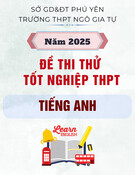


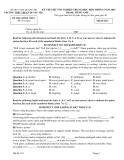
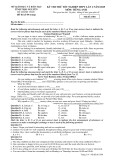
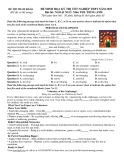
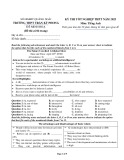
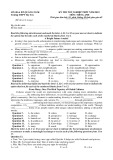
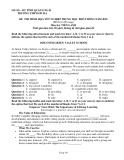
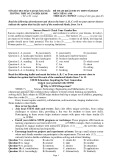







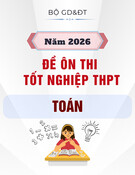

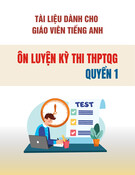
![Đề thi tiếng Anh tốt nghiệp THPT 2025 (Chính thức) kèm đáp án [mới nhất]](https://cdn.tailieu.vn/images/document/thumbnail/2025/20250627/laphong0906/135x160/9121751018473.jpg)

